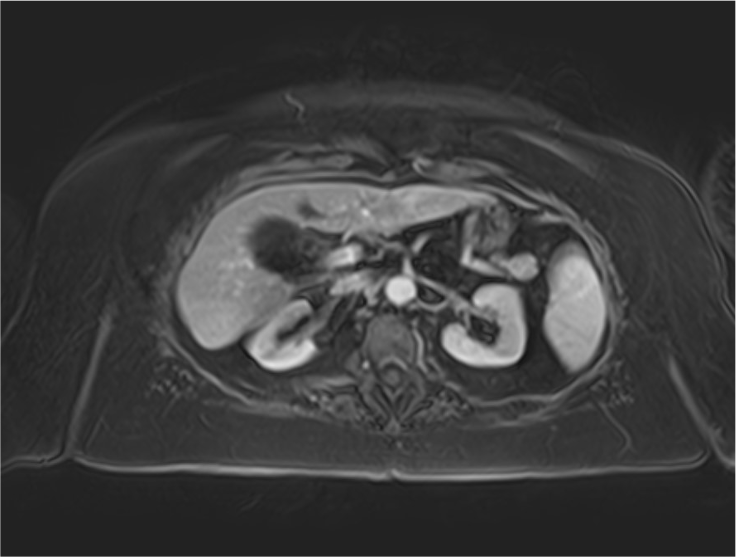Monday Poster Session
Category: Biliary/Pancreas
P2322 - Recurrent Hypoglycemia and Cognitive Decline in a Geriatric Patient: A Delayed Diagnosis of Insulinoma
Monday, October 27, 2025
10:30 AM - 4:00 PM PDT
Location: Exhibit Hall
.jpg)
Tyffany Sebastian Hurtado, MD
San Juan City Hospital
Ponce, PR
Presenting Author(s)
Tyffany Sebastian Hurtado, MD
San Juan City Hospital, Ponce, Puerto Rico
Introduction: Insulinomas are rare tumors, with incidence of 1 to 4 cases per million annually.These tumors cause hypoglycemia due to the hypersecretion of insulin from tumor’s β-cells.Chronic hypoglycemia can result in neuronal damage and cognitive decline.A prospective study by Dai et al., found that 53% of patients with insulinoma exhibited cognitive impairment, with 70% demonstrating improvement after resection.We present a case of a geriatric patient with progressive cognitive decline and recurrent hypoglycemia over decades, ultimately diagnosed with an insulinoma.
Case Description/
Methods: 76-year-old female with a long history of hypoglycemic events, initially well-controlled, presented with worsening episodes.These events coincided with cognitive deterioration and multiple emergency room visits.Her medical history included hypertension,dementia,and complete dependence on activities of daily living.On arrival,the patient’s blood glucose was 43mg/dL with neuroglycopenic symptoms.Despite dextrose infusion, hypoglycemia persisted and was challenging to manage due to neurogenic dysphagia.A nasogastric tube was placed for nutrition and prevent further episodes.Labs revealed a fasting insulin level of 33μU/mL(2-23), a concurrent BG of 26 mg/dL, C-peptide 9.67ng/mL(0.90-7.10), and proinsulin at 312.6pmol/L(≤ 18.8),consistent with endogenous hyperinsulinism.Administration of glucagon raised serum glucose, indicating an intact hepatic gluconeogenic response.Magnetic resonance imaging of the abdomen revealed a 1.7cm enhancing mass in the tail of the pancreas, consistent with insulinoma.Despite localized disease,resection was deferred due to the patient’s advanced age and surgical risk.Initial treatment with octreotide was discontinued due to cardiovascular side effects.Diazoxide was poorly tolerated due to the development of acute congestive heart failure.Her hospital course was complicated by nosocomial infections, leading to multiple organ failure and death.
Discussion: Insulinoma can be a diagnostic dilemma in geriatric patients, as hypoglycemia may be misattributed to dementia related eating disturbances.In this case, chronic untreated hypoglycemia likely contributed to her cognitive decline.The clinical course was further complicated by limited treatment due to comorbidities and side effects.This case underscores the importance of considering insulinoma in elderly patients with unexplained hypoglycemia and cognitive deterioration,as timely diagnosis and treatment may prevent irreversible neurogenic damage.

Figure: Magnetic resonance imaging abdomen with and without contrast, showing a 1.7 cm enhancing lesion in the tail of the pancreas demonstrating restricted diffusion on Diffusion Weighted Imaging, concerning for pancreatic mass.
Disclosures:
Tyffany Sebastian Hurtado indicated no relevant financial relationships.
Tyffany Sebastian Hurtado, MD. P2322 - Recurrent Hypoglycemia and Cognitive Decline in a Geriatric Patient: A Delayed Diagnosis of Insulinoma, ACG 2025 Annual Scientific Meeting Abstracts. Phoenix, AZ: American College of Gastroenterology.
San Juan City Hospital, Ponce, Puerto Rico
Introduction: Insulinomas are rare tumors, with incidence of 1 to 4 cases per million annually.These tumors cause hypoglycemia due to the hypersecretion of insulin from tumor’s β-cells.Chronic hypoglycemia can result in neuronal damage and cognitive decline.A prospective study by Dai et al., found that 53% of patients with insulinoma exhibited cognitive impairment, with 70% demonstrating improvement after resection.We present a case of a geriatric patient with progressive cognitive decline and recurrent hypoglycemia over decades, ultimately diagnosed with an insulinoma.
Case Description/
Methods: 76-year-old female with a long history of hypoglycemic events, initially well-controlled, presented with worsening episodes.These events coincided with cognitive deterioration and multiple emergency room visits.Her medical history included hypertension,dementia,and complete dependence on activities of daily living.On arrival,the patient’s blood glucose was 43mg/dL with neuroglycopenic symptoms.Despite dextrose infusion, hypoglycemia persisted and was challenging to manage due to neurogenic dysphagia.A nasogastric tube was placed for nutrition and prevent further episodes.Labs revealed a fasting insulin level of 33μU/mL(2-23), a concurrent BG of 26 mg/dL, C-peptide 9.67ng/mL(0.90-7.10), and proinsulin at 312.6pmol/L(≤ 18.8),consistent with endogenous hyperinsulinism.Administration of glucagon raised serum glucose, indicating an intact hepatic gluconeogenic response.Magnetic resonance imaging of the abdomen revealed a 1.7cm enhancing mass in the tail of the pancreas, consistent with insulinoma.Despite localized disease,resection was deferred due to the patient’s advanced age and surgical risk.Initial treatment with octreotide was discontinued due to cardiovascular side effects.Diazoxide was poorly tolerated due to the development of acute congestive heart failure.Her hospital course was complicated by nosocomial infections, leading to multiple organ failure and death.
Discussion: Insulinoma can be a diagnostic dilemma in geriatric patients, as hypoglycemia may be misattributed to dementia related eating disturbances.In this case, chronic untreated hypoglycemia likely contributed to her cognitive decline.The clinical course was further complicated by limited treatment due to comorbidities and side effects.This case underscores the importance of considering insulinoma in elderly patients with unexplained hypoglycemia and cognitive deterioration,as timely diagnosis and treatment may prevent irreversible neurogenic damage.

Figure: Magnetic resonance imaging abdomen with and without contrast, showing a 1.7 cm enhancing lesion in the tail of the pancreas demonstrating restricted diffusion on Diffusion Weighted Imaging, concerning for pancreatic mass.
Disclosures:
Tyffany Sebastian Hurtado indicated no relevant financial relationships.
Tyffany Sebastian Hurtado, MD. P2322 - Recurrent Hypoglycemia and Cognitive Decline in a Geriatric Patient: A Delayed Diagnosis of Insulinoma, ACG 2025 Annual Scientific Meeting Abstracts. Phoenix, AZ: American College of Gastroenterology.
